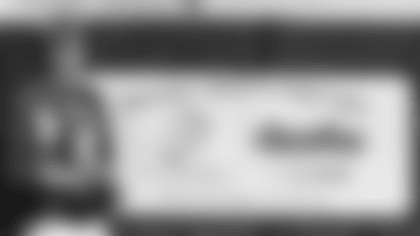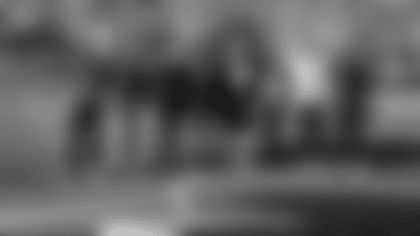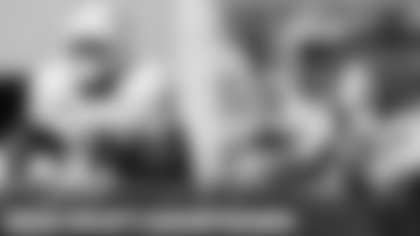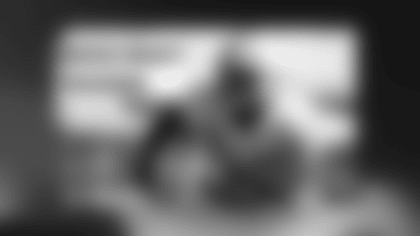[

]()
**B:** Good morning. There is no change in the injury report. We have put more emphasis on some of our situational play, both offensively and defensively this week. We did a little bit of it yesterday, but we will try to put more emphasis on it today and tomorrow and see if we can make some improvement there, in the red zone, third down, two-minute situations, that kind of thing. That is basically it. We are trying to make up for lost time here on the short week, but as I have said we've had shorter than this. In some respects we are ahead of schedule.
Q: How difficult is it to work on situational play while also trying to incorporate the game plan?
B: It is another rock on the pile, but it is obviously something that we need work on, it is something that we have to do so we are going to have to allocate the time to do it. That means taking away from some other things a little bit, but it is just too important.
Q: Why do you think there has been so much trouble, defensively, stopping teams inside the 20?
B: I think it has been a combination of things. We had some opportunities to get out of there and we just haven't quite been able to do it. We caused a fumble in the Tampa game and we weren't able to recover it. We had our hands on two balls last week for interceptions and weren't able to pull them in. We have had them on third down a couple of times down there and they were able to make the first down on third down so that keeps a drive going and gives them another chance. It has been a combination of things. I can't just say it is one thing. We have had some chances and when you get the opportunities you have to capitalize on them. When the offense makes a mistake down there defensively you have got to make them pay for it and take the ball away. It is unusual to see the ball in our hands, or close to our hands, or touching our hands, or whatever and not at some point see a turnover and that's what we need to do. It is tight down there and there are usually more opportunities to get your hands on the ball that you have got to convert them.
Q: I am sure that most teams would covet this, but is the biggest thing the defense lacks is not having a really good pass rusher right in the heart of the defensive line to collapse the pocket? If you had one wish defensively would it be to have that?
B: I don't know, I don't think that's a glaring weakness. Henry (Thomas) was in on a couple of sacks last week. Going back to preseason, not that that's what we are really talking about right now, but there has been seven games played and we have had some production on the inside of the pocket. I think defensively that you just can't single out any one thing that has been just consistently horrendous. It has been the lack of consistency, things that will look pretty good a lot of the time and then for whatever reason at one particular time it is not there and it has been in some different areas. It has been in the run defense, it has been in the pass defense, it has been at all three levels of the line - the line, linebackers and defensive backs. It hasn't been one thing that has just been overwhelming. It has been a couple of close games and one thing here or there makes a difference.
Q: Because you have built your reputation on defense, is a week like this a little more challenging because of what the Vikings present, because this is what you do best is this a little more intriguing?
B: I see it really the same every week. There are challenges every week and every offense presents different challenges for you and they come in a lot of different shapes and sizes. Whatever they are that is what you have to meet. Sometimes there are scheme problems. Sometimes there are match-up problems. Sometimes you put a game plan together and it is just the way the schedule falls and you are able to do the same thing this week that you did last week. Other times you see teams that are just, for whatever reason, you just can't defend them the same way and you have to alter it significantly form one week to the next week. Sometimes your game planning on both sides of the ball, offensively and defensively, a lot depends on what you so do the previous week. If you did something that would naturally fit the following week then you even have to make the decision there of do I still do that again because it is so obvious that this is what we are going to do or do we need a little change up and how much adjustment can you make form one week to the next based on what your rules are that carryover from week to week. In other words, if one week you are going to treat a one back offense one particular way and this is the adjustment that you are going to make with the safety and you worked on that and you have all that and the next week you get a one back offense do you want to make that same adjustment with the safety or do you want to make it with a linebacker. So there is a hundred of those things, you throw everything into the dryer and it all gets flipped around and when it comes out as a coach you have to sort it out and try to figure out what is the best way to handle it this week. Not only given what you have to defend, but knowing the mentality of your players and what they just got finished doing the previous week and then the personnel matc-hups fit into that. What I am saying is that it is a jigsaw puzzle every week. I don't think one is really any easier than another one.
Q: How much different is Minnesota with (Daunte) Culpepper than they were with (Jeff) George?
B: I didn't coach against George last year.
Q: You must have in the past as some point though right?
B: Yes, but not with Minnesota. With the Jets last year we played them in preseason, but that was more of a (Randall) Cunningham game plan. George did play in the game, but it was the last preseason game and it was different. Then when we played them with the Jets in 1997 Brad Johnson was the quarterback. (Randy) Moss wasn't there it was (Jake) Reed, so it was different. Culpepper presents his set of problems as do the other players, Robert Smith, (Andrew) Jordan, (John) Davis, Moss, (Cris) Carter, (Todd) Steussie, and (Korey) Stringer. So there is a lot of different things and again the best thing that I could say that I try to do is try to factor everything in and then make your decisions on what you think is best to do. I can't give you any formula for it. You just have to look at the whole picture and try to see how you stack up against it.
Q: From a morale point of view what do you do to keep spirits up until you turn things or is this veteran enough team that will do it for itself?
B: I don't know if it is a veteran enough team. Let me put it this way my approach isn't, 'Well everything is going to be fine just don't worry about it.' We are 0-2 and we need to address the things that have made us 0-2. That is really where my focus is, to explain to the players what we need to do to make a difference in a couple of close games to put that favorably on our side and that is what I have tried to do. I don't know whether it is a morale thing, or a coaching thing, or a strategy thing. You can call it whatever you want to call it, but it is trying to get your team ready to play another opponent, a good one and what you feel as a coach the difference is going to be in the game and to emphasize those areas.
[

]()
**Q: Is the flip side of that that they are all gloom and doom when you talk to them because there is a middle ground somewhere?**
B: I don't feel like it is gloom and doom. As a matter of fact it's what it is. It's not like we have been beat 58-0 the last two weeks.
Q: You saw Jerry Rice when you were at the Giants, I remember one game when you saw a lot of Jerry Rice, how would you compare Moss to him?
B: Totally different players, totally different players.
Q: How?
B: Moss is primarily a vertical receiver and he makes his living on deep balls, I'm not saying he is not good at other things, but his forte is deep balls, stretching the field, he is faster than Jerry Rice. Jerry Rice's strength is running short to intermediate patterns, run after the catch, finding open spots in zones, being clever, defeat man coverage, runs a lot crossing routes. Not that he can't go deep I am just saying a majority of his catches I am sure have come probably under 15 yards and I would imagine a majority of Moss's catches come probably over 15 yards. Part of it is the style of offense. Maybe if Moss played in San Francisco and Rice played in Minnesota maybe we would be seeing the same things, but I sort of doubt it. They are different type players, both good in their own way, I think really Carter is more like Rice than Moss is.
Q: You have a guy that kind of does the same thing, Troy Brown and yet he wasn't a big part of your game plan on Monday. He was off to such a good start on teams is it possible to get the ball to him?
B: I think again what you want to do offensively is have a balanced attack and try to get the ball to where you can be most productive. If it is throwing it to Troy Brown when he has got two people on him I don't think that is really the best thing to do. He made some key catches for us in the game, some third down conversions, which were big plays. We got it in his hands on the punt return and were able to get him started there. I think the guys on the punt return team did a good job of creating some space for him to get started and he was productive in that role and I think that is the way it is going to be some weeks. Some weeks some guys are going to get taken away and other guys are going to have more opportunities and that may be the same two weeks in a row or is maybe different from week to week. A little bit of that is a by-product of taking what the defense gives you. Trying to not turn the ball over and trying to be consistent with your performance, not throw five balls into double coverage and yes maybe we come up with one or maybe we come up with two, but that creates some other problems if you don't.
Q: Does he surprise you, he seems like the sum is better than the parts. He's not big, he's not that fast, not this and not that?
B: Well how does he do it?
Q: Yes does that surprise you?
B: No and I wouldn't agree with that evaluation either. He has got good speed. I'm not saying he is Randy Moss, but who is. He's got good speed. He's strong, very strong, Strong for his size. He's quick. He's got exceptional hands. If you start listing strong points for Troy Brown you are going to have a lot more strong points than you are week points. Rather than he can't do this, he can do that, he can't do this, he can't do that well anytime a player has a lot of production he has got to be able to do something. The other ten guys don't just go out there and fall down.
Q: How would you grade J.R. Redmond did last week?
B: he got a little more opportunity last week against the Jets to give Kevin (Faulk) a break. I think J.R. has made progress from when he started which was pretty late in the preseason.
Q: In practice?
B: Again it is definitely better than where he started. I think that he has still got a ways to go. Missing training camp, the bulk of it, for a rookie there are a lot of things that even though we have tried to catch him up on that he is still behind on. It's in relative terms. Relative to himself he is moving forward, relative to the players who had a big jump on him he is still behind them in some areas.
Q: Physically how do you think he is?
B: He's all right. Being slowed down by injury is that what you are saying?
Q: As far as speed, is his speed what it was when you scouted him?
B: Yes, I think physically he is about where he is going.
Q: How and why did you end up coaching defense? You say about players this one has an offensive mentality, that one has a defensive mentality is it the same with coaches?
B: My first few years in the league I was really involved in all three phases of the game and I feel very fortunate to have had that opportunity. My first year in Baltimore I worked with the defense and special teams. Then when I went to Detroit I worked on offense with the receivers and the tight ends and the special teams. It was funny when I was in Detroit I still spent quite a bit of time with the defense even though, when you are a low man on the totem pole you do a lot of stuff, so it wasn't like I was trying to not be involved there. It was just my main areas of responsibility were with the receivers and the tight ends and then working with Jerry Glanville and Floyd Reese on special teams. I immediately recognized when I got to Detroit that there were some pretty good coaches on the defensive side of the ball. The defensive coaches were Fritz Schumur, Jerry Glanville, Jimmy Carr, and Floyd Reese. I knew it would be in my best interest to try to figure out as much as I could of what they were doing at the same time they wanted to make sure that I had as little information as possible.
[

]()
**Q: Looking at Culpepper what bothers you most running inside, outside, or throwing it? What would you try to force him to do?**
B: He has made yards running inside, he's made yards running outside and he's made a lot of yards throwing. I think he does pretty well at all three. I don't think you can just say we'll clog the middle and make him run outside because he outruns people outside and if you look at the Bears game you can see if you run everybody up the field he will make a lot yards running inside. I think you have got to defend the field on him.
Q: Can I get you back to Detroit?
B: Yes, then my fourth year in the league I went to Denver and Joe Collier was the defensive coordinator out there and Richie McCabe was the secondary coach, again I was on special teams, but now back on the defensive side of the ball. So the first four years were two on offense, two on defense and all four on special teams. Then when I went to the Giants it was as a special teams coach, but I also worked on the defensive side of the ball there. The way that started in 1979, (Bill) Parcells was the linebacker coach, I was coaching special teams and breaking down film and Ralph Hawkins was the defensive coordinator. Then Bill left in 1979 and came back in 1981, but I still continued to work with the defense and special teams. Then when Bill came back in 1981 and eventually when he moved up in 1983 then I kind of moved up with him. That is sort of the history of it.
Q: Did you like defense better, or at that point you didn't care?
B: No, honestly I enjoyed all three phases. At that point I really think I enjoyed special teams more than offense or defense. I really loved coaching special teams with the Giants and for Ray. Ray was great to work for.
Q: Why, I know the importance, but tactically there seems to be limited numbers of things you can do?
B: Well it's like being a head coach because you coach the whole team. It's not like coaching the linebackers and you have six guys, or you coach the wide receivers and you have got five guys. If you coach the wide receivers and the running play doesn't work there is not much that you can do about it, you are not really involved in it. When you are a special teams coach you have the lineman on the field goal teams, you have got everybody on everything except the quarterbacks. The only guy I wasn't involved with was Phil Simms and Scott Brunner and those guys. When you run special teams meetings you have got the whole team in there. It is not like you have six guys, you have the whole group and you have to be able to manage that group and at the minimum you are coaching 66 different spots, six times eleven. Not getting into the onside return team and kickoff after a safety and some of those specialized things where you have to even substitute further. You have eleven guys on six teams and you have got to back them up with eleven guys. A lot of it is the same guys, don't get me wrong, but still you have to keep track of 120 some guys in terms of your starter and your backup plus whatever you are doing and it is a lot to manage and it's a lot of responsibility. I am not saying that because I did it, I am saying because anybody who does it knows and things happen in the kicking game that are so unpredictable, particularly when you don't handle the ball. When they are kicking to you, you don't know where they are going to kick it, or how they are going to line up to kick it, or anything else. When you are kicking it's like being on offense, you can control it. If we kickoff we are going to have five guys on each side of the kicker, but when you are receiving the kick you don't know if it is going to be seven and three, six and four, five and five, or kick to the right, kick to the left or whatever. So it is just organized chaos once the ball hits the kicker's foot. Everybody has a rule and a job and a guideline to play in, but once that ball hits the guys foot then all hell breaks loose and then you have to reorganize how everything works. It was very challenging and I really learned a lot. Not just about the kicking game, but about football and handling large groups of people and that type of thing and working with George Boutselis in Baltimore who was the special teams coach and then Jerry Glanville and Floyd Reese in Detroit. Those three guys really taught me a lot. Then there is a lot of on the job learning in New York and then that kind of grew into defense. In all honesty when I went from special teams to defense it really became a lot easier. There are just a lot less possibilities. Not saying that one is more important than the other or one is easier to do than the other, but for one guy to coach the special teams versus having three or four guys on the defensive staff, however you break it down, as much as there is on offense and defense to do, in some ways a lot less than there is on special teams.
Q: Are guys still trying to chip away at the early season rust?
B: That is a good question. I don't think it's the rust, but I think that at this level of football where everybody is good, every quarterback is good, every receiver is good, every linebacker is good, every corner is good, I mean everybody is pretty good. It is very competitive. Coaching is very good. You just don't get away with a lot of stuff. There is just a real fine line between making the play and not making, between winning and losing, between being successful and being unsuccessful in certain situations. I think there are two things on that, one is the execution of whatever it is that you are doing. The execution of the play or the execution of the defense or the punt return or whatever it happens to be, but then secondly as I try to convey to the players knowledge is power. If you know what's going to happen or even more importantly can eliminate what is not going to happen on this particular play then it enables you to play it a little bit better. If you know that the receiver is not going to run an out route, maybe he is going to run an in route or maybe he is going to run deep, but if you can eliminate the out route in a certain situation or by a certain formation then you are going to be able to play that play better. The knowledge, the preparation and the film study that goes into the game and then being able to transfer that into the classroom and then being able to transfer that from the classroom onto the field. You can give a player a test and say, 'Okay when the defense lines up in this formation and the strong safety is here, what blitz are they going to run?' A guy can draw it up on paper and it looks great and you say, 'Okay boy he knows it', but then you get out there on the field and the safety walks down there and they run that stunt and you get beat on it. Seeing it on the field and seeing it on paper are two different things. The bottom line is that you need to be able to go out there and be able to run whatever it is that you are running. But beyond that knowing the opponent, knowing the situation, knowing the scouting report of what they are going to do in that situation is just absolutely critical. I think it is the combination for us right now of overall execution, meaning knowing exactly what to do in each situation and then combining that with what is going on on the other side of the ball. How we can use whatever it is they are doing to our advantage to execute it better that is where the fine line is. Just like you said coming up fourth and one instead of being first and ten or being first and ten instead of coming up fourth and one whichever side of the ball you are on. Those are big plays. Being outside when you should be inside even though your assignment maybe doesn't even tell you to be outside or inside, but just knowing that this is a situation where I should be further outside than further inside, what they do by their tendencies. Those are the little things that in the end can make a big difference when it is a one-play game. I can't sit here and say this is the one thing because it is a combination of things. But all of those little things add up and that is the difference between one or two first downs, a little bit better field position, three points here or there and that is what these games are coming down to.

























